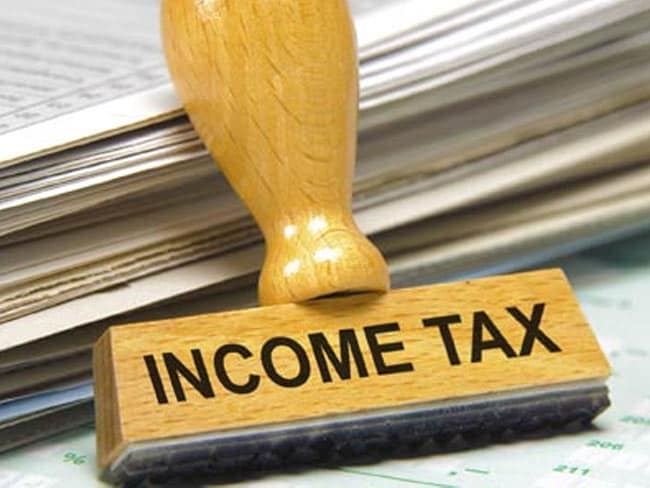Are you preparing for an Income tax interview?
Then you are in right place to know which type of questions can be asked in the Interview. First of all, I congratulate you on clearing exams for income tax. For this government section job, one must clear prelims and the mains of UPSC, or another way is to clear the exam by income tax department selection test.
Let’s start preparing for Income tax questions and answers.

Below are the Top 35 Income tax interview questions and answers, you will find basic questions like your introduction to the current scenario of income tax in India.
Let’s prepare!
Q.1 “Tell us about yourself”.
Answer: This is the first question that is asked in many interviews. Your goal for answering this question should be a brief, concise walkthrough of your career story that will show off relevant pieces of experience. The Interviewer asked this question to know about the candidate as well as to make them comfortable.
Q.2 What is Income Tax?
Answer: This is the first basic question about Income tax. It is an annual tax that is charged on an individual’s income by the government. The tax is charged for the corresponding assessment year at the rates laid down by the Finance Act for the assessment year in respect of the previous year.
The income of the person is categorized into their salaries, business, income from house property, capital gains, and income from other sources.
Q.3 How is the Income Tax Calculated?
Answer: The income tax of an individual is calculated according to his income source. Above I have mentioned categories of income tax payable types and accordingly, tax is calculated using the income tax slab issued by the government every financial year.
Q.4 What is Assessment Year?
Answer: This income tax question and answer is a must to know. Every year starting from 1st April till 31st March of next year is called an assessment year. It is the year immediately succeeding the financial year wherein the income of the last financial year is assessed. The government uses the assessment year to calculate the tax on the last year.
Q. 5 Can you define, what the previous year means?
Answer: The previous year is the year in which the individuals earn their income by all means of sources, mentioned above, and that earning becomes taxable in the following assessment year. Ex.- If the present assessment year is 2015-16 then the previous year is 2014-2015.
Q.6 Define Financial Year?
Answer: A time period of twelve months of the year starting from 1st April to 31st March, is used to calculate various annual financial statements in business and organizations is known as the financial year.
Q.7 What is the difference between this financial year, assessment year, and the previous year?
Answer: Previous year and assessment year are the types of the financial year which is having 12 months starting from 1 April to 31 March of next year. The previous financial year is the preceding year of the assessment financial year.
Q.8 Who is an Assessee?
Answer: An Assessee is a taxpayer or we can say, an Assessee is a person or individual who is liable to pay tax or any other sum of money under the Act.
Under this act, every individual in respect of whom any proceeding under this Act has been taken for the assessment of his earnings or of the income of any other individual in respect of whom he is assessable, or of the loss sustained by him or by such other individual, or of the amount of refund due to him or to such other individual.
Every individual who is supposed to be an assessee under any provision of this Act;
Every individual who is supposed to be an assessee is in default under any provision of this Act.
Q. 9 What do you mean by “The Term Person”?
Answer: A “person” signifies an individual, an ordinary partnership, a non-juristic body of a person, and an undivided estate. Under the Income Tax Act, the “person” includes an individual, a company, a Hindu undivided family, a firm, an association of persons, a local authority, and artificial juridical persons.
Q. 10 What do you understand by Total Income?
Answer: A person’s total income is the amount on which the income tax is paid. Total income includes all income that is earned or received in India. The total amount earned by a person or any company, including income from employment or providing services, payments from pension plans, revenue from sales, income from dividends, or other sources.
Total income is calculated for the assessment of taxes, analyzing the net worth of a company, or determining a person or company’s ability to make payments on a debt.
Q. 11 How many heads are there under total income?
Answer: There are five heads under total income. They are as follows
- Income from salaries
- Income from house property
- Capital gains
- Profits and gains of business or profession
- Income from other sources
Q.12 At what rate firms, are required to pay tax on their income?
Answer: Income Tax is paid at 30% of taxable income. A surcharge is charged at 10% of the Income Tax, where taxable income is more than 1 cr and education cess is 3% of the total Income Tax and surcharge.
Q.13 What is Accrued Income?
Answer: The earned income but not received is known as accrued income. Income is recorded, which is earned in the same accounting period rather than in the subsequent period in which it will be received.
Q.14 What is Fbt?
Answer: FBT (Fringe Benefit Tax) is a tax that an employer has to pay in respect of the benefits that are given to his/her employees.
Q.15 What is Tax Audit?
Answer: A tax audit is an assessment of a company and individual’s tax return by (IRS) Internal Revenue Service in order to find out that the income and deductions are recorded accurately.
Q.16 What is Taxation?
Answer: Taxation is a mode; the government uses to finance their expenditure by imposing charges on the public of that country and corporate entities. Government demands taxes on citizens to encourage or discourage certain economic decisions.
Q.17 How will you decide the residential status of profits or income taxpayers?
Answer: According to Income Tax Act provisions, the residential status of an individual is categorized as Resident and Non-Resident.
Under Section 6(1), “if an individual is in India in the previous year for a period that is at least 182 days or he is in India for a period of a minimum of 60 days during the relevant previous year and at least for 365 days during the four years preceding that of the previous year”, is said to be a resident of India. And the person who doesn’t follow this provision irrespective of his nationality is termed a Non-resident.
Q. 18 How does the tax liability of an individual gets affected due to his residential status?
Answer: According to section 5 of the Income Tax Act 1961, the tax liability of an individual gets affected due to his residential status and it also depends on the place and time and receipt of income. There is a difference between Indian income and foreign income as Indian income is always taxable in India in accordance with the residential status of the taxpayer.
Q. 19 What is AMT?
Answer: The Alternative Minimum Tax (AMT) is a way to control wealthy taxpayers from tax evasion. AMT has set different rules to calculate taxable income after allowed deductions. It is generally for higher income groups as AMT sets a limit on certain benefits that reduces a taxpayer’s regular tax amount. As a result, if the benefits on tax reduce total tax below the AMT limit, a taxpayer has to pay the higher AMT amount.
Q.20 What is the provision to get a refund for an overpayment of taxes in India?
Answer: Individual needs to file the income tax return within a specified period to claim a refund. An individual can track his refund status from the NSDL-TIN website by clicking on Status of Tax refunds and also can be traced by entering PAN and Assessment year for which the refund is to be claimed.
Q. 21 What are the Streamlined Sales and Use Tax Agreement?
Answer: The Streamlined Sales and Use Tax Agreement was introduced in 1999 by the NGA, the National Governor’s Association, and the National Conference of State Legislatures (NCSL) to simplify t sales tax collection because sales tax is 2nd largest source of state revenue after personal income taxes. It results in developing a simpler and business-friendly system. This agreement decreases the costs and administrative burdens of sales tax collection on retailers, especially those operating in multiple states.
Q. 22 What is the Securities Transaction Tax?
Answer: STT, Securities Transaction Tax was introduced at the time of the 2004 budget and applied from 1 October 2004 in India. STT is payable on the amount of taxable securities transactions. STT is just levied on the purchase and sale of those securities that are listed on the Indian Stock Exchanges. It was introduced by the Finance Minister, P. Chidambaram to restrict people from evading tax on capital gains.
Q.23 What is a Permanent Account Number?
Answer: Permanent Account Number (PAN) is a 10-digit alphanumeric number, that is issued by the Income Tax Department in the form of a laminated card as PAN so that department can view and link all kinds of transactions. The transaction includes tax payments, TDS/TCS credits, returns of income, wealth, gift and FBT, specified transactions, correspondence, etc. PAN helps the department in maintaining a fair record of every individual’s transaction through a ten-digit number in order to avoid tax evasion in any case.
Q.24 Does an NRI have to pay Property Tax if he buys property in India?
Answer: yes, NRI has to pay tax. According to Income Tax rules, income or capital gain that the NRI generates from the sale/ rent or lease of a valued property or an asset based in India will be taxable. If the property is more than 3 years old, long-term capital gains tax will be incurred on the sale of the property. Tax is payable at 20% on long-term capital gains.
Q.25 What is the difference between Excise Duty and Sales Tax?
Answer: Indirect tax imposed on goods that are manufactured and produced within the country is Excise Duty. Basic Excise Duty, Additional Duty of Excise, and Special Excise Duty are three types of Central Excise duties collected in India.
Q. 26 What do you mean by Commercial Tax?
Answer: Tax imposed on the scheduled Commercial goods as indirectly collected by the seller or purchaser against their business transaction which now comprises Sales Tax, Entertainment, Luxury Tax, Entry Tax, and Profession Tax is called Commercial Tax.
The Tax, which is imposed on the finished product, and paid by the consumer is Sales Tax. This tax is imposed on sales or purchases within the State.
Q.27 What is Form C in Sales Tax?
Answer: On inter-state sales, the sales tax is 4%, or within the State, the applicable sales tax rate for sale whichever is lower if the sale is to a dealer registered under CST and the in the registration certificate of the purchasing dealer, goods are covered. The purchasing dealer can get these goods at the concessional rate if a declaration in C form is submitted to the selling dealer.
Q. 28 What is Form D in Sales Tax?
Answer: Sale to the government is taxable at 4% or the applicable sales tax rate for sale within the State whichever is lower. on CST, this concession is applicable if Form D is issued by the government which purchases the goods.
Q.29 What is Amortization?
Answer: Amortization means when the company’s assets are written off for a number of years for its renewal or replacement and are not dependent on the life of an asset.
Q. 30 What is a deferred tax asset?
Answer: When a company pays tax early or has paid an excess tax amount and needs to get some money back from the tax authorities is termed a deferred tax asset. The term is recorded in the balance sheet and is also known as a provision for future taxation.
Q. 31 What do you mean by Taxation?
Answer: Taxation is a mode by the government to finance its expenses by imposing charges on companies and individuals. The government levies taxes on its people to encourage or discourage certain economic decisions.
Q. 32 What is a Tax refund?
Answer: The excess tax paid by a person than the actual owed by the person is returned by the government is called a tax refund. The individual need to file income tax for the year, once it is done, the income tax, tax deductions or credits, withholdings, and other factors are taken into consideration after that, an individual can receive a tax refund.
Q. 33 What do you understand by Transfer Income?
Answer: When any individual retains the ownership of an asset but makes an agreement to transfer its income but still the income is considered as his income and it will be added to the total income is called Transfer Income.
Q. 34 What is Excise Duty?
Answer: An indirect tax levied on those goods which are manufactured in India and are meant for home consumption is known as Central Excise duty. The taxable event is ‘manufacture’ and the liability of central excise duty arises as soon as the goods are manufactured. It is a tax on manufacturing that is paid by a manufacturer, who passes its incidence on to the customers.
Q. 35 What are the types of Provident Funds?
Answer: There are 4 types of provident funds, they are:
- Recognized Provident Fund (RPF): RPF schemes must be approved by the Commissioner of Income Tax and applicable to an organization that has 20 or more employees.
- Unrecognized Provident Fund (URPF): URPF is not approved by the Commissioner of Income Tax and this is started by employers and employees in an establishment.
- Statutory Provident Fund (SPF): This fund is mainly for Government, University, and Educational Institutes employees.
- Public Provident Fund (PPF): PPF involves a minimum contribution of Rs.500/annum and the maximum contribution is Rs. 100,000/annum. The contribution made along with interest earned is repayable after 15 years unless extended.
Henry Harvin
Henry Harvin is the best institute for Income tax courses. This course by Henry Harvin is ranked top by BestcourseNews.com. It offers a 360-degree insight on Income Tax and the latest taxation policies, taught by Income Tax experts, they are featured by Aaj Tak, NDTV, and Hindustan Times.
It starts every week with the virtual live session, around 12500 is course fees.
Recommended reads
50 Most Asked Accounting Interview Questions with Answers
Top 15 Business accounting and taxation courses online
Top 50 Project Management Interview Questions And Answers
Top 50 Data Science Interview Questions and Answers
Top 10 GST Practitioner Courses Online in 2022 (Exposed)
Conclusion
These are the top 35 Income Tax Interview Questions and Answers, which are generally asked in Income tax interviews. Hope this will help you to prepare for the interview.
Good luck!
FAQs
Answer: Candidates must be B.Com graduates with an aggregate minimum percentage of 50-60%.
Answer: Taxation is a highly paid service, in early time you might get less paid but after some experience, you will get a nice package. It is a stable, and fast-growing career opportunity.
Answer: There are many courses in Taxation, they are
1. Diploma in Accounting & Taxation
2. Diploma in Service Tax
3. Diploma in Taxation Law
4. Advanced Diploma in Taxation
5. Bachelor of Commerce in Taxation
6. Bachelor of Commerce in Tax Procedure & Practices
7. Master of Commerce in Finance and Taxation
8. Master of Commerce in Accounting and Taxation
9. Post Graduate Diploma in Taxation
10. Post Graduate Diploma in Tax Management and Tax Administration

















These income tax interview questions are very important for the interview. I am so glad that I come across these questions. These are the very commonly asked income tax-related questions that we need to prepare.
Thanks for sharing income tax questions with answers. Your explanations are very precise and to the point. This will surely help aspirants to cover income tax questions.
This a very good list of top income tax questions and answers. After preparing these questions very well we will surely crack the interview. These are very worthy questions for the income tax interview.
The collection of income tax interview questions and answers available on topcourselist.com is impressive. It covers a wide range of topics, including deductions, exemptions, and tax regulations, equipping candidates with the knowledge they need to excel in their interviews.
I found the Income Tax interview process to be very straightforward and well-organized. I felt that my understanding of the tax system was greatly enhanced after answering the questions.
The interviewer was knowledgeable and helpful in explaining the different aspects of the Income Tax code. I appreciate the opportunity to learn more about this important issue.
I found the income tax interview questions and answers on this website to be incredibly helpful. The explanations are clear, and the variety of topics ensures I’m well-prepared for any interview.
This website offers a comprehensive list of Income Tax interview questions and answers, perfect for anyone preparing for their tax-related job interviews. A valuable resource to boost your confidence and knowledge.
I am excited to learn about the different aspects of filing an income tax return. It will be a great opportunity to gain more knowledge and experience in the field of accounting.
I’m confident that I have a good understanding of income tax rules and regulations. I’m also eager to learn more about the subject and am confident that I can keep up with the changing tax laws.